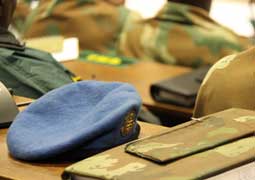
Parliament, Tuesday, 20 August 2019 – The Portfolio Committee on Defence and Military Veterans today hosted a colloquium on Civil-Military Relations (CMR) in South Africa, where robust discussions between various stakeholders provided members with various perspectives on the relationship between civilians (broader society) and the military.
In opening the dialogue, the Chairperson of the committee, Mr Cyril Xaba, said: “CMR is a contemporary and important issue that relates to a complex search of inter-relationships, established norms and practices between the armed forces and other social structures. The broader context of CMR is that it is not a fixed process, but is continuously evolving, and while South Africa can be viewed as exemplary regarding the status of its CMR, this needs to be rigorously interrogated on a continuous basis.”
An executive perspective provided by the Minister of Defence and Military Veterans, Ms Nosiviwe Mapisa-Nqakula, highlighted the post-1994 era which brought about a need to reshape CMR in South Africa. This gave way to the new vision for CMR in the 1996 White Paper on Defence, which paved a brand new path for military relations in the country.
Perspectives provided by professors in academia highlighted, amongst other things, the widening gap in CMR, the causes and impact of this and the methods of addressing this. Stellenbosch University’s Prof Lindy Heinecken, pointed to one of these methods as involving civilians in Defence debates, whilst Prof Abel Esterhuyse (Stellenbosch University) and Dr Moses Khanyile (Masharps College) spoke to the impact of the status of CMR on military effectiveness.
The committee’s researcher, Dr Wilhelm Janse van Rensburg, provided further insight by discussing Parliament’s role in shaping CMR. Dr Janse van Rensburg specifically tracked the oversight mechanisms of Parliament over a 20-year period, highlighting how Parliament’s oversight of the military in South Africa can be utilised to enhance CMR.
On the discussion of stable civil-military relations, Mr Xaba said that: "Stable and healthy civil-military relations can in part be attributed to the acceptance of the subordination of the military to civil control and the professionalism of the armed forces. Professionalisation of the armed forces is key in that it qualifies them for trust as a dependable guard of the Constitution and the territorial integrity".
He also said that today’s discussion highlighted a number of challenges in South Africa’s CMR, but also provided insight and valuable information on how this can be addressed, both in the short- and long-term. Discussions such as these, he said, will ensure that the committee builds an institutional memory insofar as matters of Defence are concerned, and those who come here from now onwards, are able to tap into that institutional memory.
ISSUED BY THE PARLIAMENTARY COMMUNICATION SERVICES ON BEHALF OF THE CHAIRPERSON OF THE PORTFOLIO COMMITTEE ON DEFENCE AND MILITARY VETERANS, MR CYRIL XABA.
For media enquiries or interviews with the Chairperson, please contact the committee’s Media Officer:
Name: Felicia Lombard (Ms)
Parliamentary Communication Services
Tel: 021 403 8285
Cell: 081 548 7011
E-mail: flombard@parliament.gov.za

